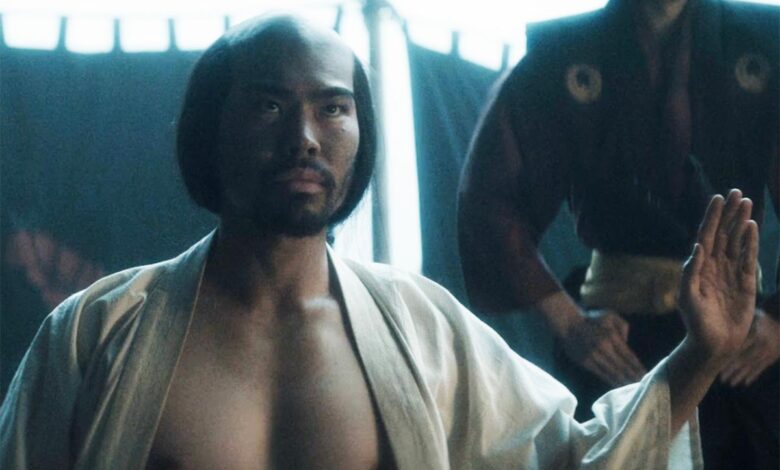‘Shōgun’ Episode 7 Recap: “A Stick of Time”

Fate as it relates to life, as either guide or cruel master, is at the center of Shōgun’s seventh episode. Of course fate weighs heavily on everybody in feudal Japan, in each decision made. But with the protective barriers Lord Yoshii Toranaga has constructed around himself, his vassals, and his forces crumbling – or being consumed by a massive earthquake, in the case of the latter – fate is top of mind for everyone. In a flashback to 1554, and a victory by the “boy warlord” in his first major battle, the defeated Lord Mizoguchi tells a 12-year-old Toranaga it was fate that led him to start a war he couldn’t win. When General Hiromatsu delivers to Fuji-sama the ashes of her husband and baby, she thanks her grandfather, but says it’s her fate to join them once her service to Toranaga is complete. (“I will end my life and become ashes, too.”) Lord Peach Fuzz – er, Nagakado, is much too publicly thirsty for a chance at fate to decide his lot on the battlefield. (More on Toranaga’s impulsive son in a minute.) And John Blackthorne, the Anjin, is stuck between his frustrated self-interest and what he owes the lord who made him hatamoto. Blackthorne’s dialogue with Mariko has been reduced to cold silences and sharp retorts, and while he initially presses Toranaga for an answer about his role in Crimson Sky, the Anjin eventually backs off. “I am ready for whatever our fate may bring…”
The first thing fate brings to the mists of Ajiro are the silver-armored legions of Saeki Nobutatsu (Eita Okuno). It’s been years since Toranaga spoke to his half-brother. But the lord of the Kantō needed a lifeline once his garrison got swallowed up by the quake. And while Saeki at first grandstands about receiving Izu in return for his help, and speaks callously about past battles and childhood embarrassments during a formal banquet held in his honor – the fish being prepared looked delicious – the warlord eventually reveals his conniving true self. He accepted an offer from Ishido to replace Toranaga on the Council of Regents. His army has blocked all of the exits out of Ajiro. He demands Toranaga answer for his supposed crimes, and that Nagakado commit seppuku for the cannonshot murder of Nebara Jozen.
Has Toranaga-sama, the master of cunning and trickery, really been outmaneuvered by Ishido and a “mongrel” like his half-brother? Even Gin, the cagey tea house madam, can’t quite believe it. “I’m afraid my future is too short for your far reaching plans,” Toranaga responds when she pitches establishing an official tea house district and courtesan’s guild in Edo. “My fate is written.” But is it? Or can fate be a bladed weapon for those whose hardships taught them how to wield it? Gin speaks only for the duration of one incense stick’s burning. But it’s a conversation that perhaps reveals some of Toranaga’s long game, and gives him something more to think about. With all of the schemes of his enemies, discontent within his ranks, and his own contemplation over the correct course of action, Toranaga-sama’s mind is a busy place.
With Saegi’s big double cross, there is more open conflict in Ajiro. The warlord brought Ishido’s demands for Toranaga to surrender. But he also brought the decapitated head of the samurai Yabushige and Omi sent to Osaka in hope of negotiating a peace separate from their sworn lord. To display his own dominance, Yabu also challenges the Anjin to cross swords, a confrontation escalated by Buntaro, whose jealousies toward Blackthorne lead his swordpoint right to the pilot’s neck (“Come on then,” Blackthorne says, tempting a new fate. “It might as well be now.”) Buntaro backs down, and is scolded by Toranaga. If the samurai doesn’t like the way the Barbarian looks at Mariko, he can’t take his head without taking his wife’s, too. The bushō won’t allow Buntaro’s rage at the foreigner to be another escape valve for his emotional and physical abuse of Mariko. And elsewhere in the village, Saegi scoffs when he hears Nagakado’s parroting about a beautiful death by the sword. To be slaughtered before you could ever be remembered is no kind of legacy. “Death is just a lonely path in the woods…”
…a path Nagakado and his wisps of facial hair will never take, because his fate turns out to be much more awkward and immediate. When Toranaga announces that he will accept his removal at the hands of Ishido, Lady Ochiba, and the Council of Regents, that he will return to Osaka in surrender – “Even when there’s evil in this land, no one has the right to tear the realm apart; Crimson Sky was a mistake” – his allies are embittered. Blackthorne calls it a guaranteed smothering, and announces in Japanese that everyone in the lord’s service will die. More like “Crimson fucking horseshit,” he adds in English. But it’s Nagakado who proves he learned absolutely no lessons from his unsanctioned killing of Jozen. That night, as rain falls outside the tea house while Saegi and the courtesan Kiku engage in a little erotic asphyxiation, Nagakado attacks. He slashes at his uncle with his blade, and they tumble through the shoji screens into the accompanying garden. But the killing blow is deferred. Nagakado’s misguided attempt at glory ends with him slipping on the garden rocks and cracking open his skull. “Where’s the beauty in this?” Saegi asks as the blood of his rash nephew blends with the waters of the ikeniwa. Because in this instance, fate has only served to further diminish Toranaga’s inner circle. For as many times as the lord of the Kantō declared to not want the title of Shōgun, he also preached against senseless bloodshed. But Nagakado was always blind to the breadth of his father’s tactical acumen. For him, fate became both gude and cruel master.
Johnny Loftus (@glennganges) is an independent writer and editor living at large in Chicagoland. His work has appeared in The Village Voice, All Music Guide, Pitchfork Media, and Nicki Swift.
Get Best News and Web Services here







